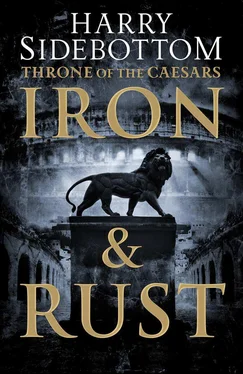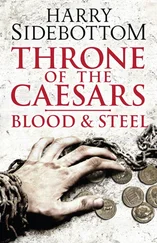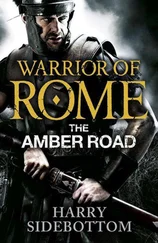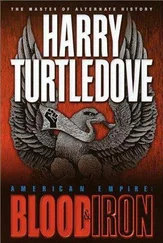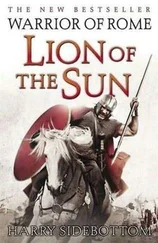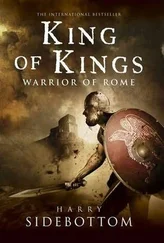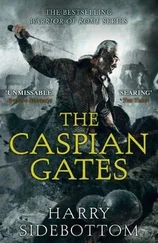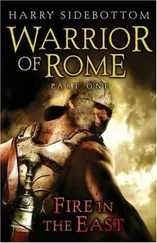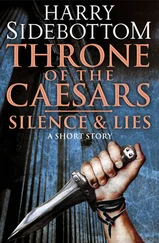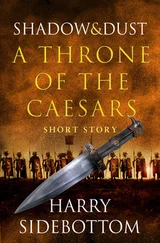Harry Sidebottom - Iron and Rust
Здесь есть возможность читать онлайн «Harry Sidebottom - Iron and Rust» — ознакомительный отрывок электронной книги совершенно бесплатно, а после прочтения отрывка купить полную версию. В некоторых случаях можно слушать аудио, скачать через торрент в формате fb2 и присутствует краткое содержание. Год выпуска: 2014, Издательство: HarperCollins Publishers, Жанр: Исторические приключения, на английском языке. Описание произведения, (предисловие) а так же отзывы посетителей доступны на портале библиотеки ЛибКат.
- Название:Iron and Rust
- Автор:
- Издательство:HarperCollins Publishers
- Жанр:
- Год:2014
- ISBN:нет данных
- Рейтинг книги:4 / 5. Голосов: 1
-
Избранное:Добавить в избранное
- Отзывы:
-
Ваша оценка:
- 80
- 1
- 2
- 3
- 4
- 5
Iron and Rust: краткое содержание, описание и аннотация
Предлагаем к чтению аннотацию, описание, краткое содержание или предисловие (зависит от того, что написал сам автор книги «Iron and Rust»). Если вы не нашли необходимую информацию о книге — напишите в комментариях, мы постараемся отыскать её.
Iron and Rust — читать онлайн ознакомительный отрывок
Ниже представлен текст книги, разбитый по страницам. Система сохранения места последней прочитанной страницы, позволяет с удобством читать онлайн бесплатно книгу «Iron and Rust», без необходимости каждый раз заново искать на чём Вы остановились. Поставьте закладку, и сможете в любой момент перейти на страницу, на которой закончили чтение.
Интервал:
Закладка:
The tramp of many feet could be heard behind the curtains, like a herd of clumsy servants. Vopiscus had stopped talking. Timesitheus had half heard him announce that Crispinus would move to Achaea, and Pomponius Julianus replace him in Syria Phoenice; all other eastern governors were to remain in place. It took him a moment to realize the import: his friend Priscus still held Mesopotamia.
Maximinus rose from the throne. Anullinus closed up beside him. Anullinus drew his sword. Everyone else looked at each other.
‘Now!’ Maximinus called.
On all sides hangings were pulled back. The heads of the counsellors swung in all directions. Everywhere the gleam of armour, the nod of plumes, as the Praetorians filed in and surrounded the consilium .
Annealed in the fires of imperial politics, none of the counsellors cracked. Timesitheus saw the hands of one or two go to the special rings many Senators wore; the rings which contained poison. Vopiscus was clutching his amulet. He and Catius Celer looked at each other, each probing the other for betrayal. Timesitheus arranged his face.
‘War is a hard master,’ Maximinus said. ‘We must advance to the Ocean, or the Germans will take Rome. It is a war to the death. On one side civilization, on the other darkness. Everything must be sacrificed to bring victory. There is no time for the luxuries of peace, no time for endless talk. Everything in the empire must be subject to military discipline.’
Maximinus turned to the standing board of sixteen. ‘The Res Publica is grateful to you. Conscript Fathers, we detain you no longer.’
Timesitheus watched the good and the great, the possessors of famous names and the designers of beautiful careers. Some could not hide their shock and anger; the eyes of Petronius Magnus bulged with fury, and the effeminate Claudius Severus was almost spitting. Others, like the unctuous Vulcatius Terentianus, appeared relieved still to be alive. The rotund Claudius Venacus blinked as if unsure what was happening.
With unconscious cruelty, the Praetorians gave the dismissed councillors time — one by one — to gabble their thanks, before driving them from the imperial presence.
Now, that was interesting. Timesitheus watched them leave. Sixteen rich, influential men, all thoroughly alienated and full of resentment; now, that could be useful to someone.
Flavius Vopiscus and Catius Celer were still staring at each other.
Well, well, Timesitheus thought, neither of you saw that coming. Your little Thracian is not as tame as you thought.
CHAPTER 7
Rome
The Subura,
Seven Days after the Ides of April, AD235
It was not yet dawn. The meeting was over. The owner of the house quietly unbolted the door, looked up and down the narrow street and gestured for the die-cutter to leave first. No further farewell passed between any of them.
Outside, it was still near dark. The die-cutter did not carry a torch. His vision was not good, anyway, beyond a few paces. As far as he could tell, the street was deserted. Hefting the bag with his tools, and his staff, he set off south. His footsteps came back loud from the blank walls. He tried to walk normally; not too fast, not too slow. The bag banged against his leg. The staff clicked on the pavement. The walls were tall, close around him. He had done this before, many times. It did not get any easier. He fought down the urge to run.
Now and then he looked over his shoulder. He did not expect to be able to see anyone, but alone at night in this district not to look around would have been suspicious. He had no particular fear of robbers. He had been born here in the Subura, knew its ways. It was too late for all but the most desperate of the prostitutes and their clients, and thus for the men who preyed on them. Although he himself had renounced violence, more than a year ago, he knew that conversion had yet to impress itself on his looks or demeanour. And he carried a big stick and had a long knife at his belt. It was not the threat of local knife-men that was making his heart pound and his palms slick with sweat.
It had been over a year. He had been lucky. They had all been lucky. They had been careful, taken every precaution, and they had prayed. Yet somehow he knew it could not last. Someone — most likely someone close to them, a neighbour, a friend — perhaps worse still a relative or one of their own — would denounce them. There would be no warning. One morning the men who the die-cutter feared would be waiting in the dark. He would not see them until it was too late, and then no weapon, no resource of character or body would save him.
The sky was lightening. There was woodsmoke in the air. He heard the first homely noises of the new day: voices muffled behind shutters, boots clumping on stairs, a child crying. Doors were thrown open, and the life of the Subura again spilled out on to the streets. Blacksmiths, cobblers, workers in wool or linen, rag-pickers, fullers and barmen; all sorts of men called back to their women, and, almost rubbing shoulders in the narrow confines, greeted each other. Once again the die-cutter was one among many, just another of the plebs urbana jostling his way through the slums of the Subura. He had survived another dawn. He was safe for another day.
The great featureless wall at the rear of the Forum of Augustus reared up in front of him, and he turned left into the street of the sandal-makers. As his fears receded, they were replaced by the mundane matters of the coming day. At the third hour he had to report to the magistrates who ran the mint. Acilius Glabrio, Valerius Poplicola and Toxotius were like all the boards of the Tresviri Monetales under which he had served — rich, arrogant, thoughtless young men blinded by their own wealth and position. Perhaps the first two were even worse than most; the style of their hair and their perfume hinted at unnatural vices. The writing was on the wall for their sort. Until the day of reckoning, the die-cutter would obey their commands, remain beneath their notice and stomach their disdain.
He glimpsed the shaded flower beds and hedges of the Temple of Peace through the gate on his right. High on the brow of the hill to his left the sun struck the roofs of the beautiful mansions of the Carinae. Swallows swooped and banked up there in the clear light. His mood lifted. He liked this street. It was broad and clean. The bookshops were opening. There had not been a sandal-maker here in living memory. The first bearded intellectuals were nosing about. Roughly barbered philosophers glowered disapproval at elegantly clad sophists. The latter moved languidly, trailed by wealthy students and an air of urbane success. The lone young men with dark circles under their eyes were probably poets. Almost everyone clutched a papyrus roll, the universal badge of culture.
The die-cutter yawned. It was early. There was plenty of time. He would treat himself to breakfast. It would be another long day. The food and drink would sustain him. By the statue of Apollo Sandaliarius he went into an eating-house called The Lyre. The owner, clad in the high-belted leather tunic of his profession, greeted him and took his order. There were only two other customers; draymen talking sleepily in a corner. The die-cutter took a seat at a table on his own.
Waiting, he ran his hand over his bag, felt the reassuring shapes of the carefully wrapped tools: the three different drills, his cutters, the burin and the graver, the tongs and pincers, the files, the compass and the pouch of powdered corundum. He knew he was good at his work. It was the one place where, far from being a handicap, his myopia became an advantage. Not for him the cunningly angled lenses, the peering through glass bowls filled with water. It was as if his eyes were designed for nothing but the closest, finest work.
Читать дальшеИнтервал:
Закладка:
Похожие книги на «Iron and Rust»
Представляем Вашему вниманию похожие книги на «Iron and Rust» списком для выбора. Мы отобрали схожую по названию и смыслу литературу в надежде предоставить читателям больше вариантов отыскать новые, интересные, ещё непрочитанные произведения.
Обсуждение, отзывы о книге «Iron and Rust» и просто собственные мнения читателей. Оставьте ваши комментарии, напишите, что Вы думаете о произведении, его смысле или главных героях. Укажите что конкретно понравилось, а что нет, и почему Вы так считаете.
